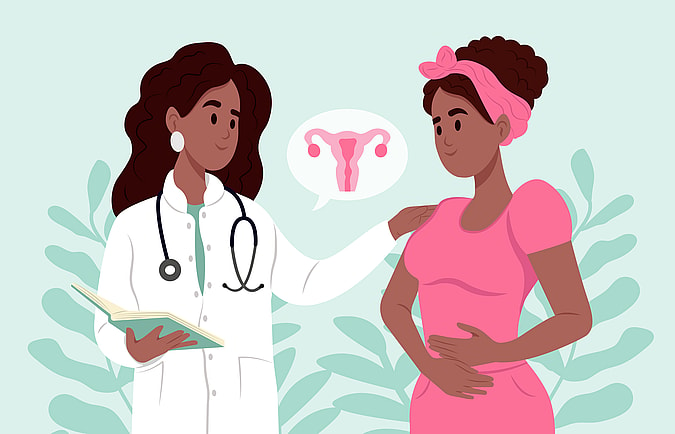Uterine fibroids, also known as myomas or leiomyomas, are non-cancerous tumors of the uterus and [are] extremely common in women, especially women of the African diaspora. According to studies, 80% of African American women will develop fibroids by the age of 50

There are several treatments and surgeries for fibroids.
“Unfortunately, the cure, and I’ll use that word for fibroids, is actually to remove the uterus [hysterectomy]” explains Dr. Thomasena Ellison, associate director of gynecology at Maimonides Medical Center in New York.
” Surgical treatment could be from minimally invasive to major open surgery, and that will depend on your fibroids,” Ellison continues. “Myomectomy is removal of the fibroids, going in and removing each individual fibroid, then there are other minimally invasive procedures like radiofrequency treatment that also remove fibroids.”
Ellison said there also are medicines that address fibroids, putting the patient in a pseudo or temporary menopausal state in which her hormones are not present every month, therefore preventing the fibroids from growing and hopefully shrinking them.
But some Black women, including Tamika Haywood — as previously reported for theGrio’s series “Unheard” — are automatically told they need to have a hysterectomy though doctors have not administered tests or checked medical histories.
According to statistics, Black women are two to three times more likely than white women to undergo a hysterectomy for fibroids. Ellison shares her thoughts on making sure women are aware of all their options and why some doctors’ automatic response is to recommend a hysterectomy.
The following is a transcript of her response to theGrio’s Jasmine Hardy.
Jasmine Hardy: A lot of Black women, when they find out they have fibroids, doctors, like you mentioned, they automatically say remove the uterus. And [women] don’t get other options.
Dr. Thomasena Ellison: That is a deep-rooted issue and problem. It goes beyond just walking into a doctor’s office and the doctor responding to your fibroids, ‘You need a hysterectomy.’ Unfortunately for the women of the African diaspora, women of color, systemic racism, unfortunately, has us coming to the doctor’s office at a much later time than we should have initially showed up with the problem.
And needless to say, fibroids grow over time. So instead of her showing up when she’s 30, she shows up when she’s 40 and that fibroid — fibroids have a tendency to grow larger and larger. And so depending on who you present to as far as your health care provider, that particular person may not be comfortable or not used to seeing fibroids that are two to three times the usual size. And so that person’s knee-jerk, unfortunately, response would be, ‘Oh, you need a hysterectomy.’
But women need to be empowered with their health care. And even though they may not have had the opportunity to show up a decade earlier, when they do show up, they need to show up with some basic information. And if not, [if] they don’t have the capability of showing up, they need to ask lots of questions.
OK, one question: What are the other options? What are the other treatments available to you? And we women know when we feel comfortable or don’t in situations. And after your conversation, if you don’t feel comfortable, it’s now time to seek another opinion.
It’s now time to make yourself available to information that’s really available. I refer my patients to the American College of Obstetricians and Gynecologists website because I know it’s a reliable website in order to receive information as opposed to just sending someone out and say, ‘Oh, well. Check it out on the internet.’ Because the internet can be a source of great information and it can be a source of information that’s not great at all.
I would also advise women to do is that, when you come to a doctor with a problem and you have not been there for your annual or your usual care, make the time to come back. Make the time to come back and say that I just want to have a conversation. I just want to hear more information as opposed to trying to get this all in one package where I’m here for my annual, I’m here for my routine stuff, but I have 15 other problems that I want to discuss. That’s not a good way to take care of your health.
This is not [the] time to get a two-for-one or a three-for-one deal. This is the time that you say, OK, I am going to set this up where I’m coming for my examination. I’m coming to hear my results and I’m coming to talk about what treatment options are available. The doctor will have time to have a conversation with you about your treatment options. Unfortunately, as I said, we tend to show up and our fibroids are tremendous size and we tend to show up to folks or providers of health care who are not used to seeing humongous fibroids, and so the reaction is ‘you need a hysterectomy.’
TheGrio is FREE on your TV via Apple TV, Amazon Fire, Roku and Android TV. Also, please download theGrio mobile apps today!

